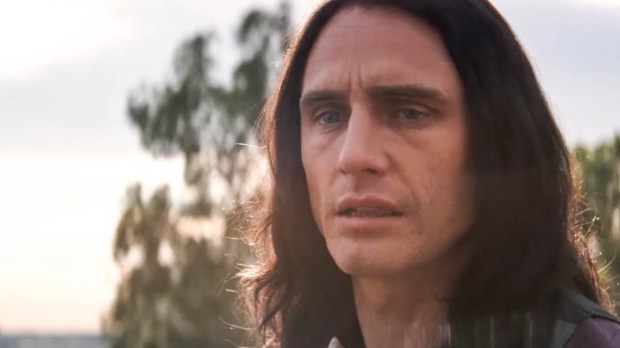The recent film The Disaster Artist portrays how the oracular Tommy Wiseau achieved his dream of writing, directing, and starring in the cult-classic and enigmatic move The Room. The Disaster Artist has garnered overwhelmingly positive reviews, and James Franco demonstrates his talent with a masterful portrayal of Wiseau, a character who remains ageless and placeless.
The story is certainly intriguing: Wiseau, a man who claims to be from the Big Easy despite his heavy Slavic accent, uses his vast financial resources from occult origins to produce “the best worst movie that was ever made.” Though The Room was released in 2003, it still plays in theaters all over the world. Wiseau originally paid to have The Room screened in theaters for two weeks, so that it would be eligible for award contention. While the original film didn’t acquire any nominations, The Disaster Artist may give Wiseau a ticket to the Academy Awards, after all.
While the film sets out to depict Wiseau semi-sympathetically, I remained slightly uncomfortable throughout my viewing. In college I had no qualms about mocking the original film to the delight (and acceptance) of my friends. But today, being a bit older and more mature, I have to ask: what was motivating my desire to see a movie about a man with no artistic talent waste millions of dollars on a terrible film?
Some years past, the theologian and Harvard professor Harvey Cox Jr. wrote about the human need for mocking our rulers and authority figures, and how it beneficially unveils deeper realities about the world — that our societal structures and those who hold them are not invincible. Cox references an example from the medieval era, a once flourishing holiday known as the Feast of Fools. During the holiday, usually celebrated at the start of the new year, townsfolk of all types “donned bawdy masks, sang outrageous ditties, and generally kept the whole world awake with revelry and satire.”
Such displays of satire and play helped to keep the social orders in check, introduce humility to those in power, and — by hinting at the arbitrariness of it all — unearth the imperfections of this world and our yearnings for another.
When I come back to Tommy Wiseau, a misguided man (and certainly not an authority figure in any substantive way) who probably deserves our sympathy more than any glorification, I’m not so sure the recent film aligns with that helpful type of parody and play. Of The Disaster Artist I feel compelled to ask: does this film’s portrayal of Wiseau, his foibles and flaws, draw attention to our collective imperfections and implicit desire for a new creation, thereby connecting us in a state of play and laughter? Or, rather, does it present him to us so we can consume him with our rapacious egos for the purposes of mere entertainment—to eschew our sense of cosmic boredom?
Christ himself was mocked as ridiculous on his way to Calvary, given a crown of thorns and scarlet robe to signify the absurdity of his claim as King of the Jews. Such mockery gave delight to the soldiers and other members of the crowd, a way to assert their authority and superiority over a peasant Jew. It revealed our tragic human tendency to find delight in the destruction of others and, in a larger sense, even our God.
Wiseau is, after all, made in the image and likeness of God. And what we “do to the least of those”—including those like Wiseau who have certain social, emotional, and mental deficiencies—we do to Christ himself.
It’s worth considering that whenever we see people who have become caricatures in the public eye, we should pray for them, especially since we can rarely do anything else for them, and be mindful that despite their flaws or dearth of virtues, they remain beloved creatures of God, and thus our brothers and sisters.
Ultimately, I’m not sure what the Christian response to a movie like this is, but in the case of Wiseau and The Disaster Artist, asking its purpose and taking a lesson in charity from it might not be a bad thing.

